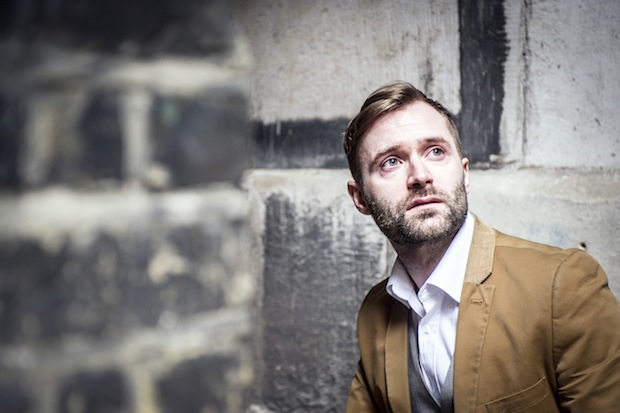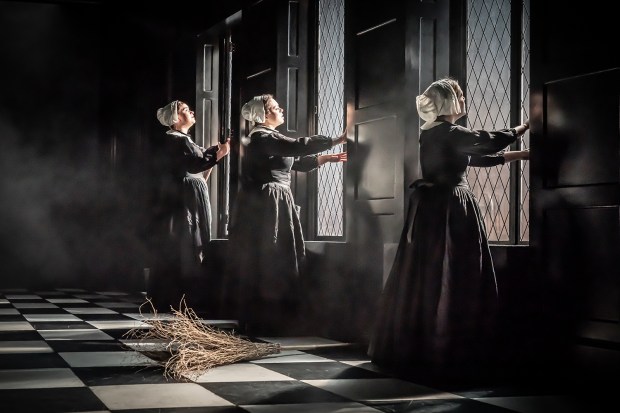The Silver Tassie is the major opening at the Lyttelton this spring. Sean O’Casey’s rarely staged play introduces us to a group of Dublin sportsmen, and their womenfolk, as they prepare to volunteer for service on the Western Front. They parade the ‘silver tassie’, a newly won football trophy, mistakenly believing it to presage victory and good fortune. O’Casey’s characterisation is a little perfunctory. The men are boastful studs, quailing dolts, blarneying drunks or violent despots. The women aren’t much better: a weeping mum, a caustic shrew, a battered martyr, a snooty beauty. It may sound colourful but the storyline develops at the pace of tree rings. And there are two lairy clowns on stage who aren’t quite as funny as they think they are.
To compensate for the script’s languid heartbeat, the director Howard Davies and his designer Vicki Mortimer indulge in a visual extravaganza. When the action shifts to France, we’re treated to an astonishing transformation as the Dublin townhouse becomes the high altar of a bombed-out church where the Irish squaddies and their British officers are sheltering from German artillery. At this point the play, already semi-conscious, slithers into a coma.
O’Casey had witnessed expressionist drama on the Continent and he decided to give it a go himself. Dispensing with narrative and character, he lays on a garage sale of symbolic bric-à-brac, rustic shanties, comic sketches, silly dances, anguished soliloquys, and bursts of working-class natter. Davies compounds these blunders by forcing the audience to experience the same acoustic horrors as the Tommies. The blithering and dithering on stage is interrupted by endless flashes and explosions, which are easily loud enough to induce shellshock in those not already enjoying its benefits. And Davies lampoons the upper-class officers (but not the infantrymen) as effeminate morons, which strikes the wrong note in this year of commemoration.
The first act ends with a massive field gun being dragged in from the wings, pointed at the audience, and fired. Veterans, beware. This show will revive all your nightmares. The third scene, in a Dublin hospital, is dramatically null although once again it’s astounding to see the French church morphing into a ward full of wheezing invalids. The closing moments, set in a dance hall, deliver a bitter-sweet resolution and a few superior pieces of drama. These include a terrific little scene in which a crippled veteran goads a former comrade by questioning the chastity of his fiancée. The rival, who is able-bodied, flings himself on the cripple, tips him out of his wheelchair and tries to strangle him to death. The rhetoric leading to this confrontation is extremely powerful, as is the fight, and it shows that O’Casey could produce top-notch drama when he wished. But there’s far too little of it in this lavish, experimental muddle.
The National can’t pretend it wasn’t warned. The play was written in 1928, at a time when O’Casey was among Ireland’s most celebrated playwrights, but it was turned down by the Abbey Theatre’s director, who declared the script opinionated and undramatic: ‘a series of almost unrelated scenes’. The director, by the way, was W.B. Yeats. No modern investor would contribute half a periwinkle to the staging of this lustreless dud and yet the NT has blown hundreds of thousands on a bizarre attempt to show that Yeats, who knew a bit about the theatre, didn’t.
A recent spate of high-profile flops has heartened anyone writing a try-out musical. If experts fail, newcomers can prosper and the Leicester Square Theatre is staging an adaptation of Oscar Wilde’s De Profundis by Paul Dale Vickers.
The script faithfully reproduces Wilde’s anguished denunciations of the heartless Bosie. The list of treasures he saw being confiscated is heartbreaking: his reputation, his talent, his financial security, his collection of art and books, and finally his right to see his sons. The show captures the intensity of Wilde’s bitterness but it can’t find any way to vary the emotional register. And the staging is threadbare. Instead of dialogue, characters, a chorus and a few dance numbers we just get sweet-voiced Alastair Brookshaw singing some very nice tunes accompanied by a piano. It feels like a Wildean tribute to Tapestry by Carole King.
The atmospheric lighting recreates the mood of Reading Gaol with great inventiveness, but the figure of Wilde himself looks as weird as an astronaut in a cathedral. Held behind bars in a Victorian prison, he’s dressed in baggy High Street loser-wear. His hair is tonsured into a Navy Seal crew cut complete with a sculpted Morrissey fringe, and his chin is beautifully smothered with a glossy layer of Beckham stubble. And the producers haven’t considered the possibility that Oscar Fingal O’Flahertie Wills Wilde might have spoken with an Irish accent. (Letters written by his foes carry cruel mockeries of his Dublin brogue.) There’s barely one fifth of a musical here. And less than one 50th of Oscar Wilde.
Got something to add? Join the discussion and comment below.
Get 10 issues for just $10
Subscribe to The Spectator Australia today for the next 10 magazine issues, plus full online access, for just $10.
You might disagree with half of it, but you’ll enjoy reading all of it. Try your first month for free, then just $2 a week for the remainder of your first year.














Comments
Don't miss out
Join the conversation with other Spectator Australia readers. Subscribe to leave a comment.
SUBSCRIBEAlready a subscriber? Log in